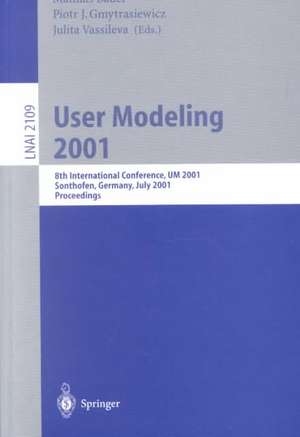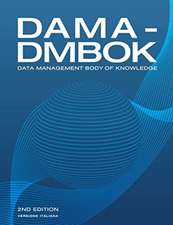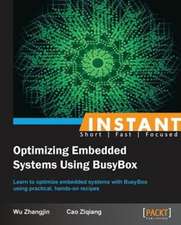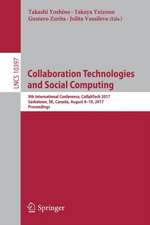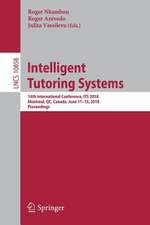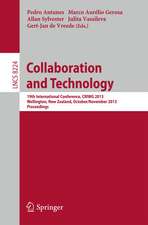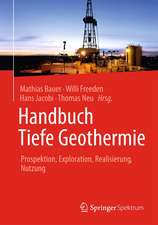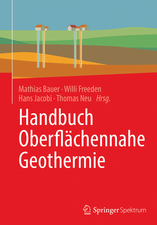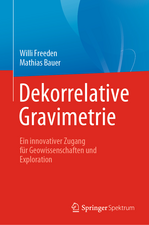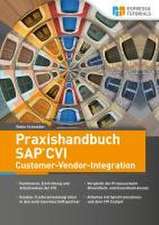User Modeling 2001: 8th International Conference, UM 2001, Sonthofen, Germany, July 13-17, 2001. Proceedings: Lecture Notes in Computer Science, cartea 2109
Editat de Mathias Bauer, Piotr J. Gmytrasiewicz, Julita Vassilevaen Limba Engleză Paperback – 27 iun 2001
Din seria Lecture Notes in Computer Science
- 20%
 Preț: 1061.55 lei
Preț: 1061.55 lei - 20%
 Preț: 307.71 lei
Preț: 307.71 lei - 20%
 Preț: 438.69 lei
Preț: 438.69 lei - 20%
 Preț: 579.30 lei
Preț: 579.30 lei -
 Preț: 410.88 lei
Preț: 410.88 lei - 17%
 Preț: 427.22 lei
Preț: 427.22 lei - 20%
 Preț: 596.46 lei
Preț: 596.46 lei - 15%
 Preț: 448.04 lei
Preț: 448.04 lei - 20%
 Preț: 353.50 lei
Preț: 353.50 lei -
 Preț: 389.49 lei
Preț: 389.49 lei - 20%
 Preț: 309.90 lei
Preț: 309.90 lei - 20%
 Preț: 645.28 lei
Preț: 645.28 lei - 20%
 Preț: 763.23 lei
Preț: 763.23 lei - 15%
 Preț: 580.46 lei
Preț: 580.46 lei - 20%
 Preț: 310.28 lei
Preț: 310.28 lei - 20%
 Preț: 655.02 lei
Preț: 655.02 lei - 20%
 Preț: 1183.14 lei
Preț: 1183.14 lei - 20%
 Preț: 340.32 lei
Preț: 340.32 lei -
 Preț: 449.57 lei
Preț: 449.57 lei - 20%
 Preț: 591.51 lei
Preț: 591.51 lei - 18%
 Preț: 938.83 lei
Preț: 938.83 lei - 20%
 Preț: 337.00 lei
Preț: 337.00 lei - 20%
 Preț: 649.50 lei
Preț: 649.50 lei - 20%
 Preț: 607.40 lei
Preț: 607.40 lei - 20%
 Preț: 1414.79 lei
Preț: 1414.79 lei - 20%
 Preț: 1024.44 lei
Preț: 1024.44 lei - 20%
 Preț: 583.40 lei
Preț: 583.40 lei - 20%
 Preț: 453.32 lei
Preț: 453.32 lei - 20%
 Preț: 575.49 lei
Preț: 575.49 lei - 20%
 Preț: 1075.26 lei
Preț: 1075.26 lei - 20%
 Preț: 585.88 lei
Preț: 585.88 lei - 20%
 Preț: 825.93 lei
Preț: 825.93 lei - 17%
 Preț: 360.20 lei
Preț: 360.20 lei - 20%
 Preț: 763.23 lei
Preț: 763.23 lei - 20%
 Preț: 340.32 lei
Preț: 340.32 lei - 20%
 Preț: 504.58 lei
Preț: 504.58 lei - 20%
 Preț: 369.13 lei
Preț: 369.13 lei - 20%
 Preț: 580.93 lei
Preț: 580.93 lei - 20%
 Preț: 343.62 lei
Preț: 343.62 lei - 20%
 Preț: 350.21 lei
Preț: 350.21 lei - 20%
 Preț: 583.40 lei
Preț: 583.40 lei - 20%
 Preț: 583.40 lei
Preț: 583.40 lei - 15%
 Preț: 438.59 lei
Preț: 438.59 lei - 20%
 Preț: 341.95 lei
Preț: 341.95 lei - 20%
 Preț: 238.01 lei
Preț: 238.01 lei - 20%
 Preț: 538.30 lei
Preț: 538.30 lei
Preț: 345.91 lei
Preț vechi: 432.39 lei
-20% Nou
Puncte Express: 519
Preț estimativ în valută:
66.21€ • 71.94$ • 55.65£
66.21€ • 71.94$ • 55.65£
Carte tipărită la comandă
Livrare economică 21 aprilie-05 mai
Preluare comenzi: 021 569.72.76
Specificații
ISBN-13: 9783540423256
ISBN-10: 3540423257
Pagini: 340
Ilustrații: XIV, 326 p.
Dimensiuni: 155 x 235 x 18 mm
Greutate: 0.79 kg
Ediția:2001
Editura: Springer Berlin, Heidelberg
Colecția Springer
Seriile Lecture Notes in Computer Science, Lecture Notes in Artificial Intelligence
Locul publicării:Berlin, Heidelberg, Germany
ISBN-10: 3540423257
Pagini: 340
Ilustrații: XIV, 326 p.
Dimensiuni: 155 x 235 x 18 mm
Greutate: 0.79 kg
Ediția:2001
Editura: Springer Berlin, Heidelberg
Colecția Springer
Seriile Lecture Notes in Computer Science, Lecture Notes in Artificial Intelligence
Locul publicării:Berlin, Heidelberg, Germany
Public țintă
ResearchCuprins
Full Papers.- Harnessing Models of Users’ Goals to Mediate Clarification Dialog in Spoken Language Systems.- Modeling the Acquisition of English: An Intelligent CALL Approach ?.- Recognizing Time Pressure and Cognitive Load on the Basis of Speech: An Experimental Study.- The Learning Shell: Automated Macro Construction.- Learning Interaction Models in a Digital Library Service.- A User Modeling Approach to Determining System Initiative in Mixed-Initiative AI Systems.- Collaborating with Focused and Unfocused Users under Imperfect Communication.- Improving User Modelling with Content-Based Techniques.- An Integrated Approach for Generating Arguments and Rebuttals and Understanding Rejoinders.- Acquiring User Preferences for Product Customization.- Utility-Based Decision Tree Optimization: A Framework for Adaptive Interviewing.- User Modelling in I-Help: What, Why, When and How.- An Adaptive User-Interface-Agent Modeling Communication Availability.- Cognitive Computer Tutors: Solving the Two-Sigma Problem.- Applying Interactive Open Learner Models to Learning Technical Terminology.- Student and Instructor Models: Two Kinds of User Model and Their Interaction in an ITS Authoring Tool.- METIORE: A Personalized Information Retrieval System.- Personalizing Delivered Information in a Software Reuse Environment.- Automating Personal Categorization Using Artificial Neural Networks.- Posters.- User Modelling as an Aid for Human Web Assistants.- Modelling the Interests of a News Service User.- Category Based Customization Approach for Information Retrieval.- Using Rollouts to Induce a Policy from a User Model.- Tailoring the Content of Dynamically Generated Explanations.- A User Model Based on Content Analysis for the Intelligent Personalization of a News Service.- ModelingExploratory Behaviour.- Ascribing and Weighting Beliefs in Deceptive Information Exchanges.- Visual Search and Background Complexity: Does the Forest Hide the Trees?.- Characterizing Sequences of User Actions for Access Logs Analysis.- Modeling Literary Style for Semi-automatic Generation of Poetry.- Perceptual Considerations for Quality of Service Management: An Integrated Architecture.- Emotions and Personality in Agent Design and Modeling.- Using Document Structures for Personal Ontologies and User Modeling*.- User-Tailored Plan Presentation.- Investigating Students’ Self-Assessment Skills.- Generating Personal Travel Guides - And Who Wants Them?.- Inspectability and User Controlled Revision on Long Term User Models.- Getting the Right Information to the Right Person.- Goals, Tasks and Application Domains as the Guidelines for Defining a Framework for User Modelling.- Doctoral Consortium.- Improving Student Models by Reasoning about Cognitive Ability, Emotions and Gender.- Integrating Multilingual Text Classification Tasks and User Modeling in Personalized Newspaper Services.- Enhancing Embodied Intelligent Agents with Affective User Modelling.- Designing TV Viewer Stereotypes for an Electronic Program Guide.- AGENDA CULTUREL An Adaptive Cultural Information Service.- Ubiquitous User Modeling for Situated Interaction.- An Intelligent Pedagogical Agent in CALL.- How to Learn More about Users from Implicit Observations1.- Student Modelling for CALL Based on Pedagogical Standards.- Evaluation of Adaptive Systems.- Supporting Negotiated Assessment Using Open Student Models.- Using Markov Chains for Structural Link Prediction in Adaptive Web Sites.- Invited Talks.- Tailoring Privacy to Users’ Needs 1.- Heavyweight Applications of Lightweight User Models: A Look atCollaborative Filtering, Recommender Systems, and Real-Time Personalization.- Eye Tracking: A Rich Source of Information for User Modeling.
Caracteristici
Includes supplementary material: sn.pub/extras
